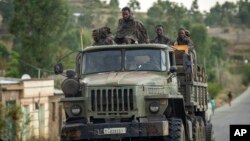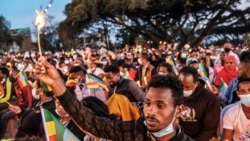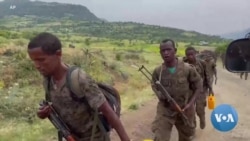The Ethiopian government marked the one-year anniversary of fighting between its forces and rebels in the northern Tigray region by suggesting its military is nearing victory.
Amid urgent global appeals for a cease-fire to the escalating violence, the government said in a statement on Facebook that the Tigray People's Liberation Front “and its puppets are being encircled by our forces” and that “a rat that strays far from its hole is nearer to death.”
“This is not a country that crumbles under foreign propaganda!” the statement added. “We are fighting an existential war!”
Tigrayan forces, however, say they are advancing on the capital, Addis Ababa, and that it could fall within months or even weeks.
In recent weeks, Oromo rebel forces have joined the Tigrayan forces in their fight against the central government, leading to what the two groups claim are significant advances.
Ethiopia’s Prime Minister Abiy Ahmed vowed that his government would prevail.
Abiy’s spokesperson, Billene Seyoum, did not respond when asked if Abiy would meet with U.S. Horn of Africa special envoy Jeffrey Feltman, who arrived in Ethiopia Thursday for a two-day visit amid growing concern over the violence.
“Ethiopia will not collapse. Ethiopia will prosper,” Abiy said, speaking in Addis Ababa on Wednesday. “Ethiopia will forever exist with her honor by defeating all who test her through the blood and bones of her children.”
The Ethiopian government declared a six-month state of emergency Wednesday and called on residents to defend their neighborhoods if rebels arrive in the capital.
“Our country is facing a grave danger to its existence, sovereignty and unity. And we can’t dispel this danger through the usual law enforcement systems and procedures,” Justice Minister Gedion Timothewos said during a state media briefing.
Debretsion Gebremichael, leader of the Tigray region, blamed the Ethiopian government and its allies for causing the suffering in the past year.
“The warmongers decided to continue with the war, and we entered into this war because the only option we had is to destroy our enemies by force.”
State Department spokesperson Ned Price on Thursday urged “all parties to end hostilities immediately — that includes the TPLF, that includes the Ethiopian government,” he said.
"We remain gravely concerned by the expanding conflict, by the violence, the expansion of the fighting throughout the country and the growing risk that it poses to the unity, to the integrity, of the Ethiopian state," he said, calling on all sides to “enter negotiations with preconditions towards a sustainable cease-fire.
After arriving in Addas Ababa Thursday, Feltman met with the government’s defense minister, finance minister, deputy prime minister and African Union chairperson Moussa Faki Mahamat. He is to hold talks with more Ethiopian officials on Friday, the State Department said.
Feltman "had a productive set of discussions” with the Ethiopian officials, Price said Thursday, and “appreciated the opportunity to do so. He'll have an opportunity to continue discussions tomorrow.”
On Wednesday, the State Department updated its travel advisory for Ethiopia to Level 4.
“What that means is we are advising U.S. citizens: Do not to travel to Ethiopia,” Price said. “We are recommending that U.S. citizens in Ethiopia consider departing now using commercial options that remain available.”
Michelle Bachelet, the United Nations High Commissioner for Human Rights, said the yearlong conflict was marked by “extreme brutality.”
“We have reasonable grounds to believe that during this period, all parties to the Tigray conflict have committed violations of international human rights, humanitarian and refugee law,” the U.N. human rights chief said during a press briefing on Wednesday. “Some of this may amount to war crimes and crimes against humanity. Civilians in Tigray have been subjected to brutal violence and suffering.”
A joint report by the U.N. human rights office and the government-created Ethiopian Human Rights Commission found that sexual violence has been rampant in the conflict, detailing reports of gang rapes by various parties against women and girls, but also against men and boys.
Price, the U.S. State Department spokesperson, said Thursday the U.S. is “carefully reviewing” the report.
The yearlong conflict has plunged about 400,000 people in the Tigray region into famine, killed thousands of civilians and forced more than 2.5 million people in the north to flee their homes, according to the U.N.
Some information in this report came from Reuters.









